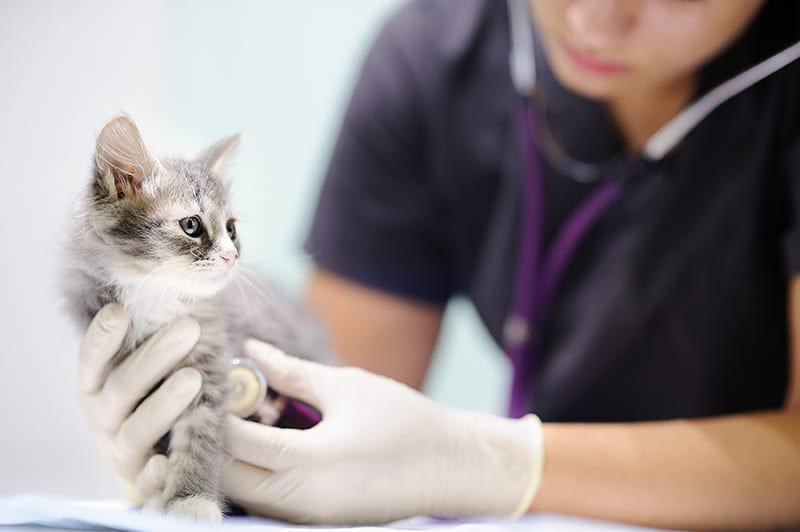Preventive Care for Cats
Preventing diseases and illnesses from developing in the first place, is the best way to help protect your cat's long-term health, but when conditions do develop, early detection and treatment are your next line of defense. The majority of health issues in cats, and people, are most easily treated when diagnosed early.
Bringing your cat to the vet regularly for routine exams provides your veterinarian with the opportunity to monitor your kitty's overall health, look for the earliest signs of disease, and offer you recommendations for the preventive care suited to your kitty's lifestyle.
Our vets at Germantown Parkway Animal Hospital in Cordova understand that the cost of routine checkups and preventive care may be a concern, especially if your feline friend seems to be in perfect health. But taking a proactive, preventive approach to your cat or kitten's health could save you the cost of more expensive treatments in the future.
Routine Wellness Exams for Cats
Bringing your feline family member in to see your vet for routine wellness exams is like bringing them to the doctor for a physical checkup. As with people, how often your cat should have a physical examination depends on their age, lifestyle, and overall health.
Most vets recommend yearly wellness exams for healthy adult cats, but kittens, senior cats, and kitties with an underlying health condition should see their vet more frequently for an examination.
Preventive Care Specifically for Kittens
For kittens less than a year old we suggest monthly exams, with their first veterinary appointment taking place when they are approximately 8 weeks old.
Over the course of their first year, kitten's require multiple rounds of vaccinations to help protect them from common infectious diseases. Kittens should get the Feline Leukemia vaccine and the FVRCP vaccine which helps protect your feline friend from 3 highly contagious and life-threatening feline diseases, Feline Viral Rhinotracheitis (FHV-1) Feline Calicivirus (FCV), and Feline Panleukopenia (FPL).
Your feline friend will be provided with these vaccines over the course of approximately 16 weeks and will go a long way in helping to keep them healthy their whole life.
The exact timing of your kitten's vaccinations will vary depending on your location and the overall health of your furry friend.
Our vets recommend having your kitten spayed or neutered when they are between 5 - 6 months in order to prevent a host of diseases and undesirable behaviors as well as unwanted litters of kittens.
Caring for Your Middle-Aged Cat's Health
If you have a healthy adult cat between 1 - 10 years old, we recommend taking them in once a year for an exam. These examinations are yearly physical checkups that are completed when your cat seems to be perfectly healthy.
Throughout your adult cat's routine exam your vet will implement a head-to-tail examination to look for early signs of diseases or other issues, such as parasites, joint pain, or tooth decay.
Your veterinarian will also provide your kitty with any required vaccines or booster shots, and have a conversation with you about your cat's diet and nutritional requirements, as well as recommend the appropriate parasite protection products.
If your vet spots a developing health issue they will explain their findings to you and recommend the next steps.
Geriatric Care for Older Cats
Cats are typically considered to be senior when they reach 11 years of age.
Because many cat diseases and injuries tend to be more common in older pets we recommend bringing your senior companion to the vet every 6 months. Wellness exams for your geriatric cat will include all of the checks and advice listed above, but with a few additional diagnostic tests to obtain extra insights into your furry friend's overall health.
Some diagnostic tests we recommend for our senior patients include blood tests and urinalysis to check for early signs of problems such as kidney disease or diabetes.
Geriatric care for cats also includes a more proactive approach to keeping your feline companion comfortable as age-related issues such as joint pain become more common. If you have a senior cat, ask your vet how often you should bring your pet in for a routine exam.
Note: The advice provided in this post is intended for informational purposes and does not constitute medical advice regarding pets. For an accurate diagnosis of your pet's condition, please make an appointment with your vet.
Is it time to book your kitty's next veterinary exam? Contact our Cordova vets today to book an appointment for your feline friend.
Looking for a vet in Cordova and Greater Memphis area?
We're always accepting new patients, so contact our veterinary hospital today to book your pet's first appointment.
Related Articles View All
Cats & Colds: Can They Get Them & What To Do?
Many people don't know that our cats can get sick, but they can catch colds just like we can! A cat with a cold will display similar symptoms as humans do such as sneezing and a runny nose. Here, our Cordova vets talk about the causes of cat colds and when to seek veterinary care.
Do cats get depressed?
Cats are known for their independent yet playful characters. So, if your cat seems sad, you're bound to be concerned. Today, we discuss signs of depression in cats, potential causes of cat depression, and what can be done to help your feline friend banish the blues.
My cat sleeps constantly, should I be worried?
No doubt about it, cats love to sleep. But how much is too much? Today, you will discover reasons why cats sleep so much and learn when to be concerned about your cat's sleeping habits.
What To Do If Your Cat or Dog Having Difficulty Breathing
Does your cat or dog's panting mean that they're having breathing difficulties? Today, our Cordova vets look at breathing difficulties in dogs and cats, and how they are treated.

